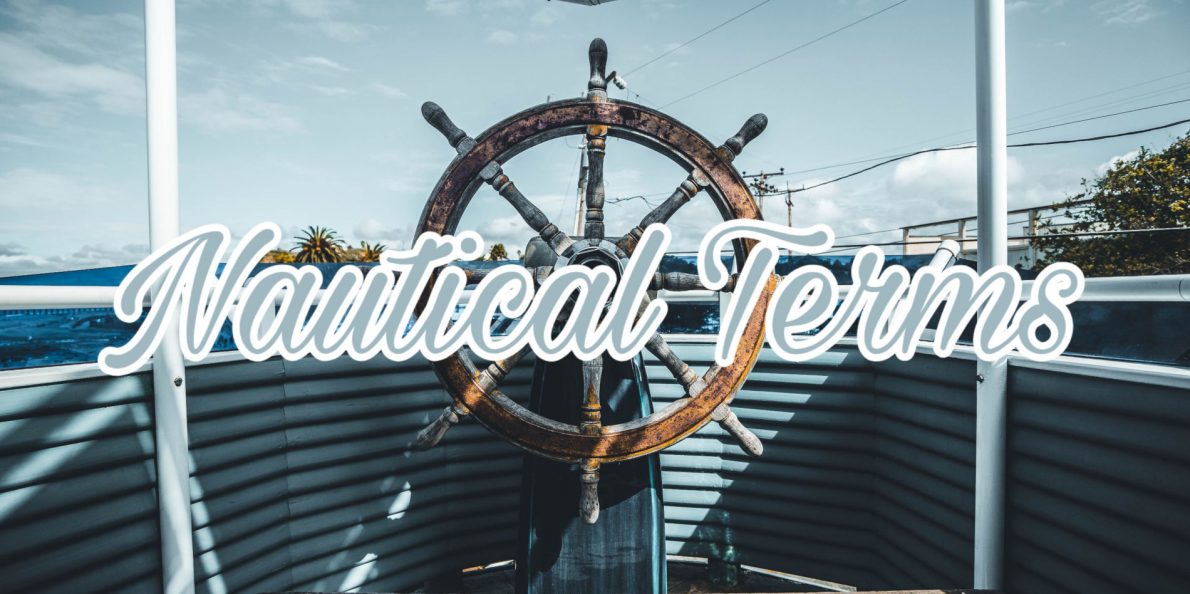The impact that Nautical Terms have had on our English language is amazing. Through the ages, new words and phrases have entered our language that tie us to the ocean. The eighteenth and nineteenth centuries had a very big impact due to the British naval and merchant ships who traveled the seas.
Funny terms you didn’t know originated from Nautical Terms

Bottoms Up: The Navy used to trick someone by giving them a beer with a coin at the bottom. Once they had the coin in their hand, they were deemed to have accepted payment and were then enrolled into the Royal Navy. The people then got wiser and would say bottoms up to look if there is a coin. Now it is used to encourage people to drink something.
Bamboozle: In the 17th century, the Spanish would hoist false flags to deceive (bamboozle) their enemies. Now it is used to describe someone who has been deceived.
Binge: When they cleaned or rinsed something out it was called binge. Now we use it to say someone who indulges in a period of activity.
Bite the Bullet: Sailors and soldiers were given a bullet to bite on when they were going into surgery before the use of anesthetics. Now it means to face up to something unpleasant.
Chock-a-block: In order for the boat to sail as close to the wind as possible, they had to pull the blocks in as tight as possible. Today it refers to something that is packed tightly and filled to its max.

Cup of Joe: The Secretary of the Navy in 1913 Josephus “Joe” Daniels abolished the officer’s wine and after that the strongest thing on the ship was coffee. This later became known as a cup of Joe.
Flimsy: When an officer was leaving an appointment, he would be issued a paper certificate to show his previous conduct. The certificate was called a flimsy. Now the word is used to describe something that is weak.
Get Hitched: This expression was used to explain the act of joining or hitching two ropes to form one. Now we use it to describe getting married.
Hulk: When an old vessel wasn’t seaworthy anymore this expression would be used. We use this expression for a big man.

Hunky-Dory: There is a street named “Honki-Dori” in Yokohama, Japan. The street catered to the pleasure of sailors who’s lives were “Honki Dori” which meant they had money. Now it means that everything is alright.
Junk: This referred to an old rope that can no longer take a load. Junk is now used to describe something that has little value.
Loose Cannon: When the cannons on a ship would break loose, they would cause chaos on the deck and the crew would struggle to get them back in place. We use this term to describe someone that is unpredictable.
May Day: This term comes from the French “m’aidez” which means help. This is still used internationally as a destress call.
Perks: This word is an abbreviation of the word “perquisites” (benefits offered with appointment). We use it to say when someone gets benefits or advantages from somewhere.

Pipe Down: A officer would whistle signifying that the shift above-deck is finished, and they are aloud to go below deck. We use it to say someone should be quiet.
Posh: The wealthy passengers’ trunks would have a label that said POSH which meant “Portside Out Starboard Home” which told the luggage handlers where to put it. This term is now used to describe something expensive or someone who is fashionable.
Rise and Shine: This was used to wake up the crew. We also use it to wake someone up or to tell them to be alert.
Skyscraper: The old square-rigged ships would have a small triangular shaped sail that was set above the other sails and they were so tall it looked like they scraped the sky. We use it to describe tall buildings.

Slush Fund: The fat from the food barrels would get sorted into a ‘slush fund’ which would be sold when they got to port. It is used now to describe a money reserve.
Son of a gun: Women who were brought onto the ship would often give birth at sea and when the child was not claimed by one of the passengers the baby would be dubbed ‘son of a gun’ because they would give birth between the cannons. It is used today to say when we are surprised.
Sponge: Debtors had a detention area where they would keep people who borrowed money that was called ‘the sponge’. Someone who uses people by borrowing money and not intending on paying the person back.
Stick in the Mud: Criminal seamen who were executed would get buried in the mud of the Thames river. This expression is used today to describe someone who is not likely to change.

Wash Out: Messages were written on a slate which would get whipped clean when the message was complete. Now this term is used to describe someone who is a failure.
For more information on Nautical Terms check out Crewseekers Nautical Slang in Common Use Blog.
Stay tuned for Part 2 on Nautical Terms.





